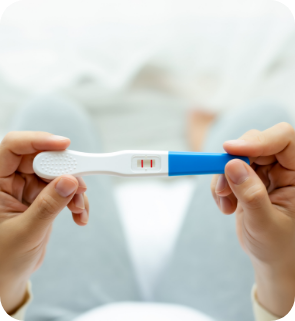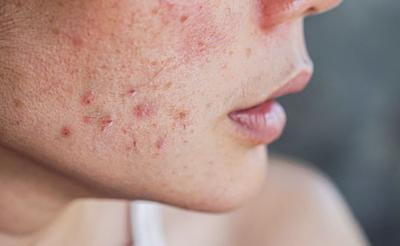
Insulin Resistance In PCOS: Symptoms & Treatment Guide
What Is Insulin Resistance? 🤔
Insulin resistance is a condition where the cells of your body no longer respond to the hormone, insulin, as normal. Produced by your pancreas (a gland that sits behind your stomach), insulin helps to regulate your blood sugar levels.
Its primary job is to move the sugar from your bloodstream into the cells of your body so they can use it for energy. A straightforward function, and when all is running well - perfecto!
When blood sugar levels rise, like after a meal high in carbohydrates, your pancreas will release insulin into the bloodstream. This insulin will attach itself to the glucose (blood sugar) and shuttle it into the cells of your body that require energy to function.
As a result, bringing your blood sugar levels back down to normal. When this happens, your pancreas stops its release of insulin as it is no longer required.
Let’s paint a picture and illustrate this. Think of insulin as the key to the cells of your body. Without insulin, your blood sugar (glucose) cannot get into the cells that need it; they can’t open the doors by themselves. This leads to high blood sugar levels (hyperinsulinemia) and, over-time, can lead to prediabetes and type II diabetes.
In someone with insulin resistance, the cells are no longer receptive to insulin. It’s as if the lock on the door is rusted and now the key (insulin) no longer works properly. This causes a build up of blood sugar levels and high insulin levels, leading to many of the PCOS symptoms that are experienced.
specialstart Insulin resistance is a condition where the cells of your body no longer respond to the hormone, insulin, as normal. This leads to high blood sugar levels (hyperinsulinemia) and, over-time, can lead to prediabetes and type II diabetes. specialend
The Link Between Insulin Resistance & PCOS 🔗
Understanding the diagnosis criteria for PCOS illuminates the link between insulin resistance and PCOS. The current, most common diagnosis criteria used is the Rotterdam criteria, which states you must satisfy at least 2 of the 3 following criterion:
- Irregular menstrual periods caused by a lack of ovulation or by irregular ovulation
- Higher than normal androgen levels (hyperandrogenism)
- Polycystic ovaries on pelvic ultrasound.
As mentioned above, insulin resistance leads to a build up of high blood sugar levels, which results in high insulin levels. It is high insulin levels that cause the ovaries to over-produce androgens (testosterone), making insulin resistance an important factor in maintaining hyperandrogenemia.
Consequently, insulin resistance is referred to as a leading cause of androgen excess in women with PCOS. There are two reasons for this:
First, in those with insulin resistance there is reduced production of sex hormone binding globulin (SHGB). SHGB is a protein that is produced by your liver and binds tightly to the sex hormones testosterone, dihydrotestosterone (DHT), and estradiol (an estrogen) to help maintain regular levels throughout your bloodstream.
SHBG is stimulated by factors such as cortisol, estrogen, and GH (growth hormone). Inversely, however, SHGB is decreased by androgens, insulin, prolactin, and IGF-1 (insulin like growth-factor).
Because insulin resistance leads to high insulin and high androgen levels, this condition causes you to produce less SHBG - meaning that the levels of testosterone become ‘free’, leading to increased overall androgen levels. Decreased SHBG levels are found in women with PCOS and are more prevalent in women with PCOS who are also obese.
specialstart Insulin resistance & PCOS are not mutually exclusive. However, between 65-70% of women with PCOS will be insulin resistant. specialend
Second, as mentioned above, high insulin levels directly stimulate the ovaries to produce androgens. At your ovaries, insulin resistance leads to defective actions of follicle stimulating-hormone (FSH) and insulin like growth factors (IGF), which ultimately leads to excess production of androgen hormones such as testosterone.
According to a 2012 study, all women with PCOS should be treated for insulin resistance. Firstly, due to its prevalence: Between 65-70% of women with PCOS will have varying degrees of insulin resistance; and secondly, because of hyperinsulemia’s negative effect on metabolic and reproductive hormones.
In other words, insulin resistance is the cause of many PCOS symptoms you may be experiencing such as irregular menstrual cycles, weight gain, acne, and facial hair growth.
Insulin Resistance Symptoms In PCOS 📝
It is recommended that you are diagnosed with insulin resistance via correct blood tests before taking any action toward treatment. Assuming you have PCOS and insulin resistance may be detrimental to your quest for improving symptoms.
specialstart The recommended blood tests for diagnosing insulin resistance: The Fasting insulin or glucose Challenge test. specialend
However, even before a blood test diagnosis there are signs and symptoms that can often indicate insulin resistance. The most common symptoms are:
- High testosterone (androgen) levels, produced by the ovaries
- Weight gain and/or difficulty losing weight
- Increased hunger and cravings
- Hair growth and/or loss
- Irregular periods and infertility
- Poor energy levels; fatigue.

Explained: Insulin Resistance & Weight Gain
An insulin resistant cell is no longer able to receive adequate amounts of nutrients and energy it needs to function optimally. This causes a cascading series of connected issues associated to weight gain.
- The insulin resistant cells will no longer recognise insulin, the hormone which acts as a key to the cell door, allowing nutrients and energy to enter the cell.
- This leads to a build-up of glucose and insulin in the bloodstream which can be extremely dangerous. In response your body dumps large amounts of glucose into fat cells, leading to increased fat gain.
You could be eating the exact same amount as your best friend but you are gaining weight and they are not.
- Seeing as the cells are no longer receiving required amounts of nutrients, they send signals to the brain to decrease energy levels, leaving you feeling constantly tired, exhausted and drained.
- At the same time, the cell sends signals to the brain to increase hunger and cravings, hoping to increase the amount of nutrients it receives. This is why some women with PCOS have to deal with constant cravings and feelings of hunger.
- When you combine increased fat storage (energy partitioning), decreased energy levels, increased hunger & cravings, it's the perfect storm for PCOS weight gain.
specialstart Essentially, being resistant to insulin is starving your cells of energy despite maintaining an adequate caloric intake. specialend
Insulin Resistance PCOS Treatment: Diet Tips & Proven Supplements ✨
The most effective way to reduce insulin resistance, thus high insulin levels in PCOS is to increase your insulin sensitivity. Fortunately, there are many peer-reviewed studies that highlight natural remedies - especially in the areas of diet, exercise and supplementation.
PCOS & Insulin Resistance Diet Guide 🥑
Your diet heavily influences the rise and fall of your blood sugar levels and as they rise, insulin is released. Therefore, the higher your blood sugar levels, the higher your insulin levels; the higher your insulin levels, the worse your insulin resistance becomes. And as your insulin resistance worsens, as does the severity of your insulin resistance-associated PCOS symptoms.
Related Article: Diet Tips For PCOS & Insulin Resistance
Based on this sequence of events, diet can be utilised as a strategy for regulating blood sugar and insulin levels. Here are 6 evidence-backed tips for adopting an insulin resistance-friendly PCOS diet:
🍬 Cut out sugar: Consuming sugar is the fastest way to increase the amount of glucose in your bloodstream; the more glucose, the higher your insulin levels.
🥗 Go low-carb: Consuming sugar is the fastest way to increase the amount of glucose in your bloodstream; the more glucose, the higher your insulin levels.
🥒 Go low-GI carb: Consuming sugar is the fastest way to increase the amount of glucose in your bloodstream; the more glucose, the higher your insulin levels.
🌿 Consume turmeric & cinnamon: Consuming sugar is the fastest way to increase the amount of glucose in your bloodstream; the more glucose, the higher your insulin levels.
🍵 Drink green tea: Consuming sugar is the fastest way to increase the amount of glucose in your bloodstream; the more glucose, the higher your insulin levels.
Insulin Resistance Supplements 🤩
Supplements can complement and often induce healthy lifestyle behaviours that lead to increased insulin sensitivity and reduced insulin resistance.
Essentially, supplements can help to regulate hormones and assist in overall balance which helps to maintain consistency across diet, exercise and other insulin-sensitising routines.
Here are 3 supplements backed by PCOS results, and recommended by peer-reviewed research:
1. Inositol: The Most Researched Supplement For Improving Insulin Sensitivity In PCOS

Inositol acts on the cells of your body as a secondary receptor to the hormone insulin. This is beneficial for insulin resistance as inositol acts as a second 'door' allowing insulin to unlock the cell delivering nutrients into the cell in a healthy process.
In other words, it improves insulin sensitivity and will help to reverse the symptoms of insulin resistance like weight gain, fatigue and tiredness, cravings, infertility and hyperandrogenism.
Related Article: Inositol For PCOS: Benefits, Dosage & Side Effects
2. Magnesium: A Vital Mineral For Reducing Insulin Resistance In PCOS

Magnesium is the fourth most abundant mineral in the body, and women with PCOS may not be getting enough of it. According to a study in the Journal of Gynaecology and Endocrinology, women with PCOS are 19x more likely to have a magnesium deficiency.
Magnesium plays a vital role in glucose and insulin regulation by helping glucose enter cells. Sufficient levels of magnesium can improve insulin resistance quite drastically. There are many other additional benefits; enough so that it has been coined a ‘miracle mineral’ for women with PCOS.
3. N-Acetyl Cysteine (NAC): A Powerful Metformin Alternative For Reducing Insulin Resistance

NAC is emerging as an extremely beneficial supplement, especially for women with PCOS. One study found that NAC can improve lipid profile, fasting blood sugar and fasting blood insulin better than metformin.
A systematic review published in Obstetrics and Gynaecology, involving eight randomised controlled trials with 910 women that compared the effects of NAC with placebo or metformin in women with PCOS, concluded:
🤯 Both NAC and Metformin improved BMI, total testosterone, insulin, and lipid levels compared to NAC.
🤯 Compared with Metformin or placebo, NAC significantly reduced fasting blood glucose in women with PCOS.
Frequently Asked
Lorem ipsum dolor sit amet, consectetur adipiscing elit, sed do eiusmod tempor incididunt ut labore et dolore magna aliqua. Elementum sagittis vitae et leo duis ut. Ut tortor pretium viverra suspendisse potenti.
Lorem ipsum dolor sit amet, consectetur adipiscing elit, sed do eiusmod tempor incididunt ut labore et dolore magna aliqua. Elementum sagittis vitae et leo duis ut. Ut tortor pretium viverra suspendisse potenti.
Lorem ipsum dolor sit amet, consectetur adipiscing elit, sed do eiusmod tempor incididunt ut labore et dolore magna aliqua. Elementum sagittis vitae et leo duis ut. Ut tortor pretium viverra suspendisse potenti.
Lorem ipsum dolor sit amet, consectetur adipiscing elit, sed do eiusmod tempor incididunt ut labore et dolore magna aliqua. Elementum sagittis vitae et leo duis ut. Ut tortor pretium viverra suspendisse potenti.
















